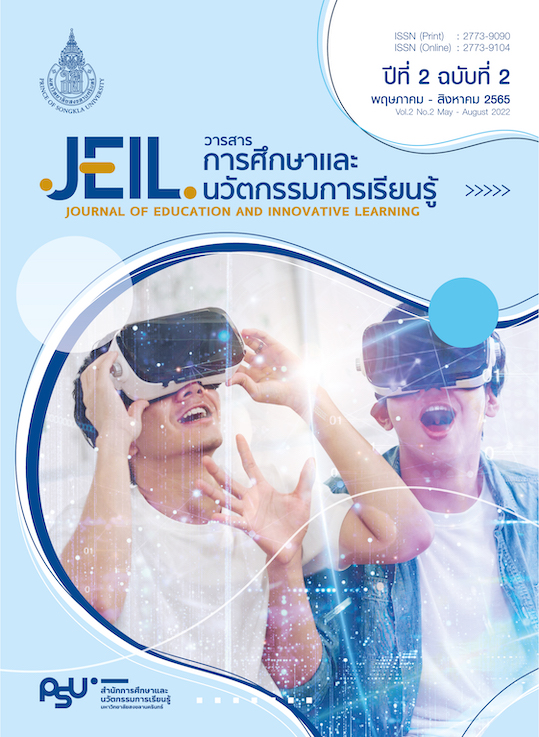แนวทางพัฒนาระบบไอซีทีเพื่อการจัดการนวัตกรรมทางการศึกษาของมหาวิทยาลัยเทคโนโลยีราชมงคลในประเทศไทย
Main Article Content
บทคัดย่อ
วัตถุประสงค์ของการวิจัยครั้งนี้ 1) เพื่อศึกษาสภาพการพัฒนาระบบไอซีทีเพื่อการจัดการนวัตกรรมทางการศึกษาของมหาวิทยาลัยเทคโนโลยีราชมงคลในประเทศไทย 2) เพื่อสร้างรูปแบบของฟังก์ชันระบบไอซีทีเพื่อการจัดการนวัตกรรมทางการศึกษาของมหาวิทยาลัยเทคโนโลยีราชมงคลในประเทศไทย และ 3) เพื่อนำเสนอแนวทางการพัฒนาระบบไอซีทีเพื่อการจัดการนวัตกรรมทางการศึกษาของมหาวิทยาลัยเทคโนโลยีราชมงคลในประเทศไทย การวิจัยครั้งนี้ใช้ระเบียบวิธีวิจัยแบบผสานวิธี กลุ่มเป้าหมาย ได้แก่ คณาจารย์และผู้มีส่วนเกี่ยวข้องกับระบบไอซีทีและนวัตกรรมทางการศึกษา และผู้ทรงคุณวุฒิด้านระบบไอซีทีและนวัตกรรมทางการศึกษา วิธีดำเนินการวิจัยมี 4 ขั้นตอน เครื่องมือที่ใช้ในการวิจัย ได้แก่ แบบสอบถาม แบบสัมภาษณ์ และแบบสนทนากลุ่ม สถิติที่ใช้ในการวิเคราะห์ข้อมูลเชิงปริมาณ ได้แก่ ค่าความถี่ และร้อยละ ส่วนเชิงคุณภาพเป็นการวิเคราะห์แก่นสาระ
ผลการวิจัยพบว่า แนวทางการพัฒนาระบบไอซีทีเพื่อการจัดการนวัตกรรมทางการศึกษาของมหาวิทยาลัยเทคโนโลยีราชมงคลในประเทศไทยที่เหมาะสมมีประเด็นสำคัญก็คือ การพัฒนานวัตกรรมทางการศึกษา 5 ด้าน ได้แก่ (1) หลักสูตร (2) วิธีการเรียนการสอน (3) สื่อการสอน (4) การวัดและการประเมินผล และ (5) การบริหารจัดการ แนวทางการพัฒนาระบบไอซีทีเพื่อการจัดการนวัตกรรมทางการศึกษาที่มีประสิทธิภาพจะประกอบด้วย 1) การออกแบบและใช้งานระบบไอซีทีควรให้ตอบสนองต่อการทำงานทุกฟังก์ชัน 2) การใช้วิธีการมาตรฐานในการพัฒนาระบบเพื่อให้การใช้งานมีประสิทธิภาพและตรงตามวัตถุประสงค์ 3) การสร้างสิ่งสนับสนุนการเรียนรู้ควบคู่ไปกับเทคโนโลยีทั้งในส่วนของผู้บริหาร อาจารย์ บุคลากร และนักศึกษา และ 4) การวางแผนและกำหนดเป้าหมายของผู้ใช้งานระบบไอซีทีที่ชัดเจนและต้องตอบสนองต่อการใช้งานเป็นสำคัญ
Article Details

อนุญาตภายใต้เงื่อนไข Creative Commons Attribution-NonCommercial-NoDerivatives 4.0 International License.
เนื้อหาและข้อมูลในบทความที่ตีพิมพ์ในวารสารการศึกษาและนวัตกรรมการเรียนรู้ ถือเป็นข้อคิดเห็นและความรับผิดชอบของผู้เขียน ซึ่งกองบรรณาธิการวารสาร ไม่จำเป็นต้องเห็นด้วยหรือร่วมรับผิดชอบใด ๆ และไม่สงวนสิทธิ์การคัดลอกบทความเพื่อใช้ประโยชน์ทางวิชาการ แต่ให้อ้างอิงข้อมูลแสดงที่มาของบทความทุกครั้งที่นำไปใช้ประโยชน์
เอกสารอ้างอิง
Anand Shankar Raja, M., & Kallarakal, T. K. (2021). “COVID-19 and students perception about MOOCs” a case of Indian higher educational institutions. Interactive Technology and Smart Education, 18(3), 450-474. doi:10.1108/ITSE-07-2020-0106
AzorÌn, C. (2020). Beyond Covid-19 supernova. Is another education coming?. Journal of Professional Capital and Community, 5(3/4), 381-390. doi:10.1108/JPCC-05-2020-0019
Brunetti, F., Matt, D. T., Bonfanti, A., De Longhi, A., Pedrini, G., & Orzes, G. (2020). Digital transformation challenges: strategies emerging from a multi-stakeholder approach. The TQM Journal, 32(4), 697-724. doi:10.1108/TQM-12-2019-0309
Davenport, T. H. (2018). 1 Artificial Intelligence Comes of AgeóSlowly, In P. Michelman, (Ed.), The AI advantage: How to put the artificial intelligence revolution to work (1-22). Cambridge, MA: The MIT Press.
Fumasoli, T., Barbato, G., & Turri, M. (2020). The determinants of university strategic positioning: a reappraisal of the organisation. Higher Education, 80(2), 305-334. doi:10.1007/s10734-019-00481-6
Hamdan, K. M., Al-Bashaireh, A. M., Zahran, Z., Al-Daghestani, A., AL-Habashneh, S., & Shaheen, A. M. (2021). University students' interaction, Internet self-efficacy, self-regulation and satisfaction with online education during pandemic crises of COVID-19 (SARS-CoV-2). International Journal of Educational Management, 35(3), 713-725. doi:10.1108/IJEM-11-2020-0513
Laudon, K. C., & Laudon, J. P. (2019). Management information systems: Managing the digital firm. (15th ed.). New York, NY: Pearson Education Indochina.
Linzalone, R., Schiuma, G., & Ammirato, S. (2020). Connecting universities with entrepreneurship through digital learning platform: functional requirements and education-based knowledge exchange activities. International Journal of Entrepreneurial Behavior & Research, 26(7), 1525-1545. doi:10.1108/IJEBR-07-2019-0434
Ministry of Higher Education, Science, Research and Innovation. (2019). Higher Education Act B.E. 2562 (2019). Bangkok: Shipping and Parcel Printing Houses. [in Thai]
Nilsook, P. (2012). Educational information technology. Bangkok: Text Production Center of King Mongkutís University of Technology North Bangkok. [in Thai]
Panjarattanakorn, D., Onsampant, S., Wachirawongpaisarn, S., Phomdee, R., Ngameesri, U., & Phakamach, P. (2021). ICT system management guidelines for the development of teaching and learning innovation in higher education institutions. Proceedings of Payao Research Conference 2021, 10, 3892-3907. Retrieved from http://www.prc.up.ac.th/proceedings/Proceedings10.10.pdf [in Thai]
Phakamach, P. (2010). ICT system and modern management. Bangkok: Witty. [in Thai]
Phakamach, P., Phomdee, R., & Wachirawongpaisarn, S. (2021). The educational innovative organization in the digital era model for higher education management under new normal situations in Thailand. Proceedings of Research Administration Network Conference 2021, 349-363. Retrieved from http://research.swu.ac.th/booksfile/RANC%20Proceedings.pdf [in Thai]
Phakamach, P., Wachirawongpaisarn, S., & Panjarattanakorn, D. (2021). Development of active learning management platform using constructivism on the topic of ICT system and innovation for educational administration at graduation level. Journal of Education and Innovative Learning, 1(3), 219-237. [in Thai]
Phakamach, P., Wachirawongpaisarn, S., Phomdee, R., Sinlapee, A., & Panjarattanakorn, D. (2021). Innovative practices in higher education administration. Proceedings of The Second RMUTR International Conference 2021, 2, 228-239. Retrieved from https://rmutrcon.rmutr.ac.th/2021/en/wp-content/uploads/2021/08/Proceedings-ICON-v2.pdf [in Thai]
Phakamach, P., Wachirawongpaisarn, S., Phomdee, R., Vachungngern, P., & Rodniam, N. (2021). The effective organizational strategy factors of success of using the digital education platforms in higher education institutions in northeastern region. Proceedings of The 9th PSU Education Conference 2021, 283-293. Retrieved from https://educonf.psu.ac.th/download/proceedings/9thPSUEd.pdf [in Thai]
Rehman, U. U., & Iqbal, A. (2020). Nexus of knowledge-oriented leadership, knowledge management, innovation and organizational performance in higher education. Business Process Management Journal, 26(6), 1731-1758. doi:10.1108/BPMJ-07-2019-0274
Sinlarat, P. (2020). The path to excellence in Thai education. RICE Journal of Creative Entrepreneurship and Management, 1(2), 60-75. doi:10.14456/rjcm.2020.12
Smith, K. D. (2021). Is it face time or structure and accountability that matter? Moving from a flipped to a flipped/hybrid classroom. Journal of Applied Research in Higher Education, 13(2), 609-621. doi:10.1108/JARHE-08-2019-0229
Wachirawongpaisarn, S., Soeikrathoke P., & Phakamach, P. (2021). The development of online teaching-learning platforms on the topic of financial accounting using collaborative learning management techniques for undergraduate students of the faculty of business administration. In W. Lertpaitoonpan (Ed.), Proceedings of 16th Professional and Organizational Development Network of Thailand Higher Education Annual Conference 2021, 187-197. Bangkok: Professional and Organizational Development Network of Thailand Higher Education. [in Thai]
Wilkins, S. (2020). The positioning and competitive strategies of higher education institutions in the United Arab Emirates. International Journal of Educational Management, 34(1), 139-153. doi:10.1108/IJEM-05-2019-0168


